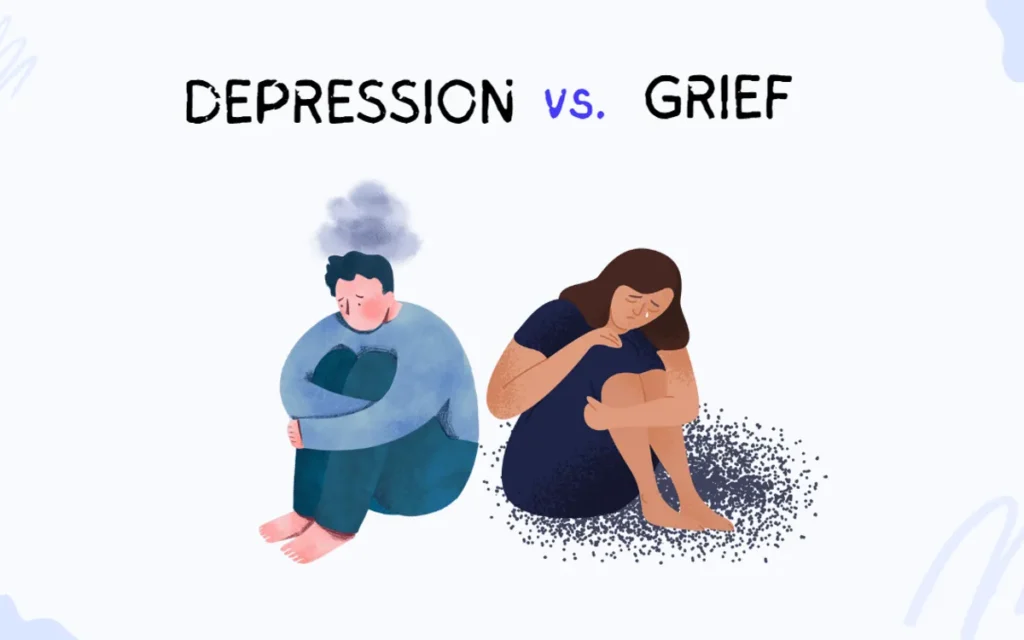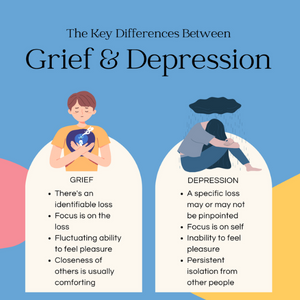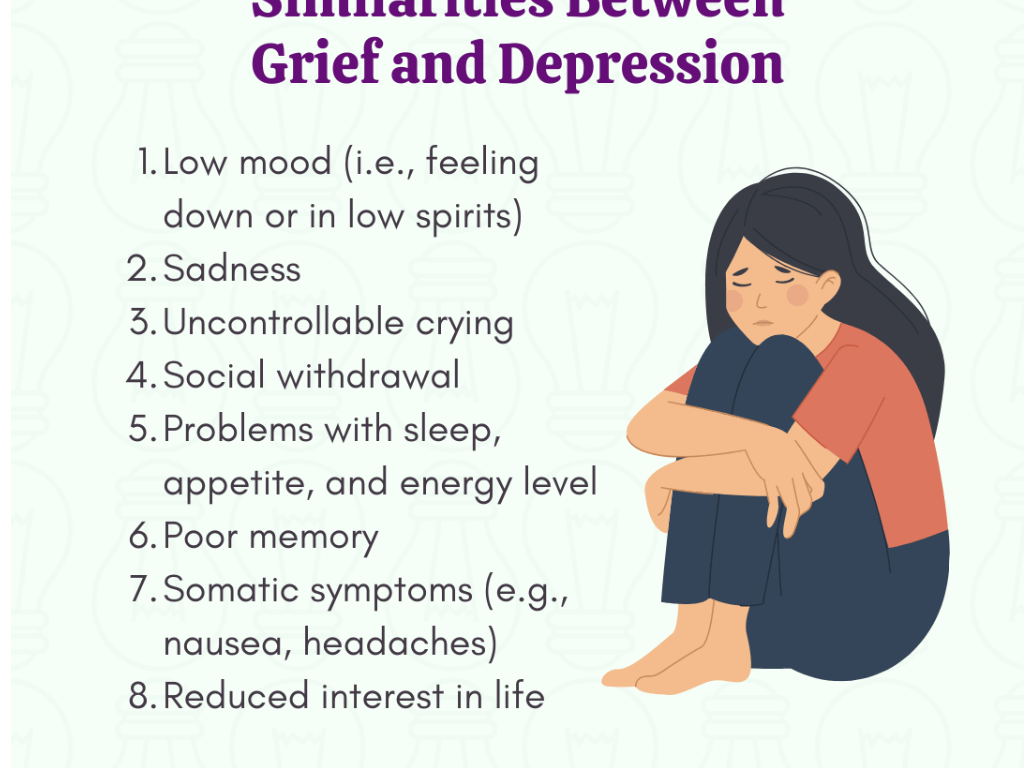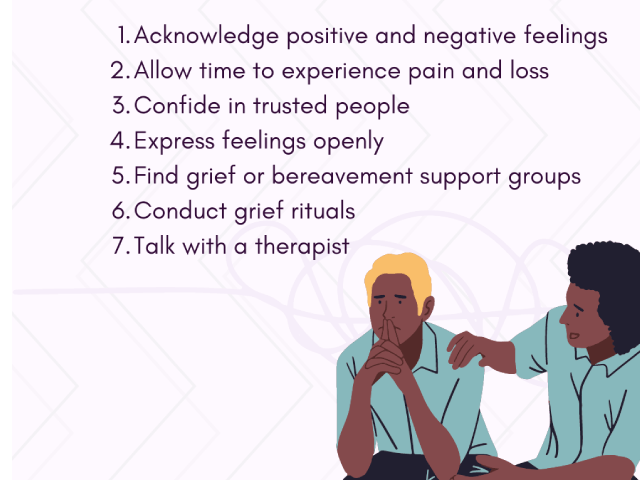Grief and sadness are both feelings that are similar. Having said that, each is also a unique experience. It’s important to know the differences between grief and depression in order to treat their signs in the best way

We’ll talk about what sadness and depression are and why they can be hard to tell apart. After talking about how sadness and grief are different, we’ll talk about some ways to treat each one. Both can be treated, by the way
Quick Look
Grief and depression both cause very sad feelings. Sadness, on the other hand, doesn’t go away over time, but loss does. Also, the diagnosis and appearance are not the same. To help everyone, there are often two or more treatment options: medicine and therapy.
How to Explain Grief and Depression
The American Psychological Association (APA) says that grief is “the pain that comes after a major loss, usually the death of a loved one.”1. You can also feel sad when you lose a pet, a relationship, your health, your job, or something else important to you.
Different stages of grief
Denial: This is the first thing that comes to mind.
Anger: When a person realizes they can’t keep denying reality, they get angry, especially at people who are close to them.
Bargaining: In this third stage, the person hopes they can avoid something that makes them sad.
Separation anxiety, confusion, and living in the past all too often are signs of loss. Grief can even be life-threatening in the worst cases, either by lowering our immune systems and making us more likely to get sick or by making us think about committing suicide.
If you are thinking about committing suicide, call the National Suicide Prevention Lifeline at 988 to talk to a trained counselor who can help you.
Please look at our National Helpline Database for more mental health tools.
The APA says that depression is “extreme sadness or despair that lasts more than days.”This mental health condition can make it hard to do normal daily things, and it can also show up in the body as pain, changes in weight (gains or losses), trouble sleeping, and tiredness.
Depression can also make it hard to think clearly. People who are depressed might have trouble focusing, feel useless or guilty, think about death, or have suicidal thoughts or act in ways that make them feel like they should kill themselves.

Why it’s tough to tell the difference between grief and depression
There are many ways in which loss and depression are alike. This can make it hard to tell the difference between them.
Cause is one thing they have in common. Loss and suffering can cause grief.3. When someone we care about or a friend dies, we feel sad because they are no longer with us. When we lose our job or are told we have a serious illness, we feel sadness because we feel like we’ve lost life as we know it.
In the same way, sadness is the same. This condition is often caused by a combination of things, such as genes and the environment4, but it can also be brought on by stress or loss. For instance, losing your sense of safety and security after being a target of crime or the end of a relationship can both make you depressed. This kind of sadness is called situational depression.
Some of the symptoms are also the same. A person who is grieving can have some of the same physical and mental effects as someone who is depressed. These effects include
- A lot of sadness
- No sleep
- Getting irritable or angry
- Not feeling well
- Loss of weight
How Grief and Depression Are Different
Even though sadness and grief have a lot in common, they are also very different in some important ways. These differences can be seen in both how they are identified and how their symptoms show up.
Differences in Diagnostics
The factors needed to diagnose a mental illness are laid out in the Diagnostic and Statistical Manual of Mental Disorders (DSM). The “bereavement exclusion” was taken out of the description of major depressive disorder (MDD) in the DSM-5, which is the most recent version of this guide.
Before, this exclusion said that someone with depression symptoms shouldn’t be labeled with MDD for the first two months after the death of a loved one. The DSM-5 does acknowledge that sadness and MDD are different, but they can also happen at the same time. Also, loss can sometimes lead to a major depressive episode, just like other stressful events.
The DSM-5 text revision (DSM-5-TR) also added a new condition for people who are still very sad a year after a loved one died. People who have been through a lot of tragedy or stress may develop a new condition called prolonged grief disorder (PGD).
People with PGD feel terrible emotional pain and longing for the person they’ve lost, are obsessed with the loss, have trouble figuring out who they are, feel emotionally numb, and try to avoid things that remind them of the loss. Having PGD signs can make it hard for a person to go about their daily life and get back into it.
What You Need to Know About the Sad Stage of Grief
Differences in Presentation
Gloom tends to go away over time, while depression tends to get worse when you think about or are reminded of the loss or pain. It can also come on in waves.9 On the other hand, sadness is more widespread and lasts longer.
In other words, someone who is suffering might feel better in some places, like when family and friends are nearby to help. But things like the birthday of a loved one who has died or going to a wedding after getting divorced could bring back the sadness.
What about depression? That kind of depression tends to be there no matter what. One exception to this is atypical sadness, where good things can make a person feel better.10 A person with atypical depression also often has signs that are the opposite of what people usually experience with grief, like sleeping a lot, eating a lot, and gaining weight.
In addition, sadness usually makes a person want to see their lost loved one again, while depression usually makes them feel the opposite. When someone is depressed, they might not want to do anything or see anyone.
Help for depression and grief
You can get help for depression and loss. Treatments can be different for each person depending on their situation and how bad their symptoms are, but they usually include therapy, medicine, or both.
Therapy
Psychotherapy, which is sometimes just called “talk therapy,” can help with both grief and sadness. It works by teaching us good ways to deal with our feelings and helping us understand them.
Interpersonal psychotherapy (IPT) is a type of therapy that is often used to treat depression, but it may also help people who are going through a lot of loss. IPT works on getting rid of symptoms, making friends, and doing things that make you feel better.13
Cognitive behavioral treatment that is specifically designed for grief may help people who have been grieving for a long time.14 Cognitive behavioral therapy (CBT) and this method both use techniques like re-framing negative thoughts and learning healthy ways to deal with stress. It can also teach us how to stay close to people we’ve lost in a good way.
Complicated grief therapy (CGT) is another choice that has been shown to help people who have lost a loved one, especially those who are not on antidepressants.15 There are parts of both CBT and IPT in this type of grief therapy. You might talk about how you lost a loved one and set goals for yourself and your relationships during CGT meetings.
Medicines
Antidepressants are a group of drugs used to treat sadness. A doctor or psychiatrist may also recommend an antidepressant to people who are going through severe and upsetting grief symptoms.
The Help of Others
Having support from other people can also help a lot when you are dealing with sadness or grief. A lot of mental health workers say that people who are going through or have been through similar problems should go to a support group.19
Whether you go to a support group for sadness or a support group for grief, you may feel better after talking about your problems with other people, getting their support, and hearing their stories.
Getting Help for Blues or Grief
If you are having trouble deciding between grief and depression or depression and grief, a doctor or mental health worker can help you figure out the best way to treat your symptoms. Tell them how you really feel, how bad your symptoms are, and how much they affect your life.
Remember that being sad is not a sign of weakness. In the same way, asking for help when you’re depressed is a sign of strength and can help you get better.
Depression is when you feel sad or have a bad mood that won’t go away for a long time. Grief is how you feel when someone you care about dies. Even though some of the signs of each are similar, depression is a real illness that is often caused by an imbalance of chemicals in the brain.
Grief and depression are two different things, but they both involve feeling very sad and can have an impact on your body and mind. People who are grieving may think that their sadness is depression, but depression can happen on its own.
Sources say that sadness or losing a friend or family member can cause major depressive disorder and other health problems that are linked to depression. Some theories say that the grief neurological pathway can stop the brain’s reward system with neurotransmitters, which leads to sadness.
The Centers for Disease Control and Prevention (CDC) say that 1 in 6 people will experience depression at some point in their lives. This can be due to a number of factors, including genetics, environment, situation, biology, or psychology.
When you lose someone or something close to you, you may feel grief, which can look like deep sadness or depression. When these feelings don’t go away over time, you may have complicated grief (CG) or prolonged grief disorder.
Always keep in mind that grief and depression are different for everyone and don’t have to fit nicely into one category.
This piece talks about how depression and grief are different and how they are the same. It will also talk about how to deal with both.

What makes them different?
The National Institute of Mental Health (NIMH) says that depression is a serious mood condition that changes the way a person thinks, feels, and acts. No one knows for sure what causes depression, but it can be caused by problems with how the brain controls mood, stressful events, genes, or the environment
But there is a clear reason for grief. Grief is deep sadness over the death of a loved one, whether that person or animal was close to you. Depression can come from grief or even cause it, but the causes of the two can be different. Grief can happen in many scenarios where someone has lost someone. Among these are:
- stopping a relationship or getting a divorce
- losing your job getting a serious or long-lasting illness
Grief is a normal reaction to losing someone or something you care about. It comes from the feelings you have when that person or thing is gone. People normally go through stages of grief that end with acceptance and a feeling of being better. On the other hand, depression may not have a clear cause and can last for a very long time.
Grief and your health
The Diagnostic and Statistical Manual of Mental Disorders (DSM) used to say that doctors shouldn’t give someone a major depression disorder diagnosis in the two months after a loved one dies. But this exclusion for bereavement has been taken away so that the role of major sadness during bereavement is not missed and there is still a chance for proper treatment.
Psychotherapy is one type of medicine for depression
- medicine for depression
- Counseling, cognitive behavioral therapy (CBT), and interpersonal therapy (IPT)
- Help groups for people dealing with depression and/or loss
- Care for Grieving
- ADEA, the Association for Death Education and Counseling, and the Compassionate Friends Depression Hotline are all good places to get help.
- Lifeline for Suicide Prevention
- Hospice and Palliative Care Organization of the United States

In short
Grief and depression both cause mental pain, among other things. But sadness is a normal reaction to losing someone or something, and depression is a real illness. Grief can be so strong for someone that they become sad, and it can last for more than two months. This could be long-term sadness disorder.
Accepting your feelings and talking to people you care about can help you deal with loss. Medications like antidepressants may also be used to help depression.
It’s hard to explain how sadness and depression feel because everyone is different. It’s important for both to get help when they think they need it.


